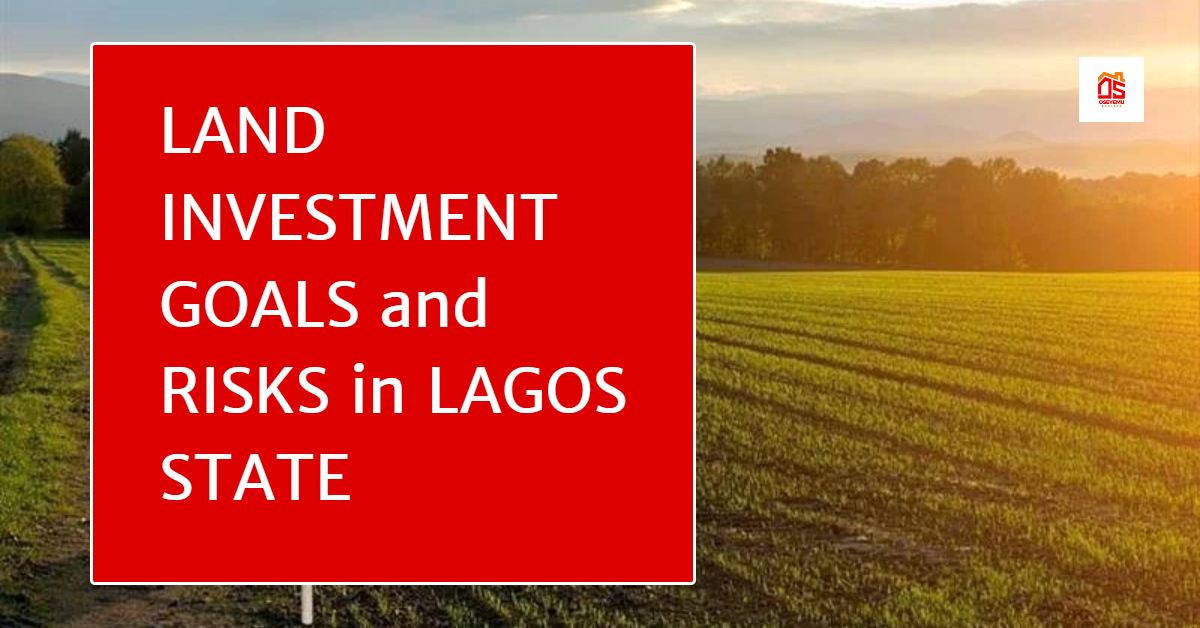
Land Investment Goals and Risks in Lagos State
When purchasing land in Lagos State, one mistake most people make is not having any plan(s) for such land. Before you decide on acquiring a piece of land, you must decide what goal you plan to achieve from the investment.
Different investors and buyers have different reasons why they are choosing to invest in a particular piece of land, and it should be noted that while there are endless possibilities on what land can be used for, zoning requirements can constrain the use of a specific piece of land. This post however carefully explains some land investment goals/plans and the risks that can be involved.
There are several land investment goals and each needs to be considered at a time.
- Buy and sell
This is a situation where a buyer purchases a portion of land cheaper than the expected market value and puts the land on sale at a price more than its actual market value. In this case, the buyer is hoping for a quick sale of the land with little to no additional work.
- Buy and hold
Here, a buyer holds on to a piece of land for some time after purchase, with the hope of the land appreciating in value. The buyer will be responsible for any additional costs of maintenance on the land during the time of the hold and could also rent/lease it out periodically. This is a common approach in fast-developing areas. The investor buys the land with the hope to resell it in the future as the area becomes developed and more popular.
- Buy, entitle, and sell
An investor could also sometimes purchase land, and go through the process of having the property entitled and zoned for a specific use. Being able to entitle a piece of land and zone for residential use would make it more valuable and desirable to potential buyers because the entitlement is one extra step they do not have to do themselves.
- Buy, develop, and hold
A real estate investor could also purchase a raw piece of land intending to situate a building or structure for a suitable purpose. Such purposes could include erecting buildings and structures to be used for rent and generally managed by the investor.
- Buy, cultivate, and hold
In this case, a buyer is more interested in using the piece of land for agricultural purposes than having a building property on the land. The buyer may want to grow crops or farm on the land, actively manage it, and hope to make a profit off its produce.
- Buy, develop, and sell
Some investors also have plans to acquire land, develop it by erecting buildings and then sell it to end-users. This is quite different from “Buy, develop and hold” because the investor gets to sell off the land along with the property or structures built on it after development.
- Buy, and use
Finally, a buyer could have plans to purchase a piece of land for personal use either for residential or commercial purposes depending on the zoning requirement. The buyer here does not have any intentions to rent out or sell off the acquired land.
Clearly stating the above reasons for acquiring land, we should consider a few risks to be considered when buying land in Lagos State. As earlier discussed, an undeveloped piece of land seems to hold endless possibilities. As much as these possibilities exist on purchased land, there are also many challenges you might face as you try to develop or sell the land. Such restrictions could be governmental or environmental. Some of them are:
- Zoning Limitations
One major risk you must have in mind when buying land is zoning classification. Every land, since it is government-owned, is zone-classified and has limitations on its land use. This classification is what divides land for various purposes such as residential, commercial, agricultural, industrial, or even mixed-use.
If a specific land is zoned for residential purposes and you plan on building a residential property on it, you’re good to go. However, if you want to use such land for industrial or commercial use, then you may have a war on your hands, as such re-classification could take a whole lot of process which could make it seem near impossible.
Another zoning factor will be the size and structure of the development you will be allowed to build. This is where the land-to-building ratio comes in, which explains how large a structure or building you can have on the land. Under such limitations are also setback requirements, lot coverage, structure plan, and so on.
- Environmental Challenges
Another risk of buying an unused piece of land is that you do not know what lies beneath the open surface. Just beneath the topsoil, you could encounter high levels of huge stones or rocks.
Some soils could be unstable and unsuitable to build on as it could cause the building foundation to crack.
The land could be located in a swampy or flood zone. Raising the property structure, changing the grading system or filling the swamp could help, but they all could come as huge and extra expenses. Oftentimes these factors are deal-breakers for potential buyers.
You should also consider the security of the whole area. Some environments are hostile. The crime rate of the location where you plan to purchase land must be duly considered before you venture into buying such.
- Access to Utilities
When buying land, you also must consider how easy is it to get utilities at the location. These utilities should include electricity, good roads, internet coverage, and so on. If an undeveloped area, find out how soon development will get to the location. Know if neighbouring areas have these basic utilities, or if they’re ‘on the way’. If you are unable to gain access to necessary utilities, it may be a disaster for any potential development you envisage.
- Expense over income
When you buy a new portion of land, know that it is not generating income until you start actualizing your plans for it. Nevertheless, you will still be responsible for the maintenance expenses on the land such as regularly clearing the grass, paying for security, and other necessary expenses.
See you next time!

